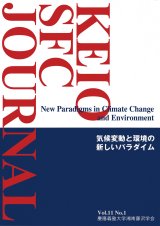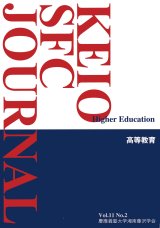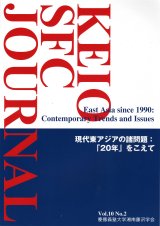- HOME
- KEIO SFC JOURNAL
- Vol.11 No.1

KEIO SFC JOURNAL Vol.11 No.1 New Paradigms in Climate Change and Environment
published on 2011.09
-
Climate Change Mitigation and Adaptation: International Response
Hironori Hamanaka Project Professor, Graduate School of Media and Governance, Keio University Masataka Watanabe Project Professor, Graduate School of Media and Governance, Keio University International community has been taking actions to address climate change under the UN Framework Convention on Climate Change and its Kyoto Protocol. In order to avoid serious impact of climate change, it was recognized that mitigation and adaptation actions, as well as the support by developed countries to developing countries in terms of finance, technology development and transfer, and capacity building, would need to be enhanced after 2012, when the first commitment period of the Protocol will expire. International negotiations are currently being conducted with a view to building a new international climate regime.
Download this article (PDF): SFCJ11-1-01.pdf -
The Outcomes of CBD-COP10 and Future Perspective for Achieving Aichi Biodiversity Targets
Seishu Okuda Global Biodiversity Strategy Office, Biodiversity Policy Division, Nature Conservation Bureau, Ministry of the Environment Tsunao Watanabe Director-General, Nature Conservation Bureau, Ministry of the Environment The 10th meeting of the Conference of the Parties to the Convention on Biological Diversity (COP10) held in Nagoya, Aichi Prefecture in October 2010 adopted 47 decisions including "Strategic Plan 2011-2020 (Aichi Biodiversity Targets)" as well as "Nagoya Protocol on Access to Genetic Resources and the Fair and Equitable Sharing of Benefits Arising from their Utilization to the Convention on Biological Diversity." While it has been pointed out that, with the continuing loss of biodiversity, some ecosystems may soon reach a tipping point beyond which their resilience will be overcome and the situation will become irreversible for future generations, he demonstrates challenges and basic policies of efforts for realizing a life in harmony with nature, following the results of COP10.
-
Optimizing Material Flows - Resource Recovery, Zero Waste and Sustainable Consumption as Paradigms in Urban Development
Steffen Lehmann Professor & Director, Research Centre sd+b, University of South Australia, Adelaide This paper explores the notion of sustainable urban metabolism and "zero waste". There is now a growing interest in understanding the complex interactions and feedbacks between urbanization, material consumption and the depletion of our resources. The link between increasing urbanization and the increase of waste generation has been established for some time. However, the impact of urban form and density on resource consumption is still not fully understood. Human population on the planet has increased fourfold over the last hundred years, while - in the same time period - material and energy use has increased tenfold. Beyond energy efficiency, there are now urgent challenges around the supply of resources, materials, food and water. After debating energy-efficiency for the last two decades, the focus has shifted to include resource and material-efficiency. The topic of reducing urban household consumption and strategies to reducing the material requirements for buildings (in fact, of the entire construction sector) has only recently emerged as an urgent field. While there is a general acknowledgment that there is a need for improved urban governance processes and rethinking of urban development patterns to reduce material consumption and optimize material flows, this is still a relatively new research field and there is still a lack of reliable data and comparative methodologies. One of the findings of this paper is that embedding "zero-waste" requires strong industry leadership, new policies and effective education curricula, as well as raising awareness (education) and refocusing research agendas to bring about attitudinal change and the reduction of wasteful consumption.
Download this article (PDF): SFCJ11-1-03.pdf -
Environmental Design Practice and Research-education - Possibilities and Visions
Hiroto Kobayashi Associate Professor, Graduate School of Media and Governance, Keio University The author speculates on the future visions of Environmental Design in both academia and practice, using examples from both Keio University Shonan Fujisawa Campus and other research institutions. The work highlights the importance of applying international perspectives to site-specific design problems, as well as the utility of a global network for enabling continuous collaboration.
-
Bringing together Mitigation and Adaptation in the Search for New Paradigms that Respond to Global Climate Change
Wanglin Yan Professor, Faculty of Environment and Information Studies, Keio University Tomohiro Ichinose Associate Professor, Faculty of Environment and Information Studies, Keio University Kazunori Tanji Assistant Professor, Faculty of Environment and Information Studies, Keio University The international negotiations against global warming at UNFCCC/COP face the daunting challenge of making an agreement beyond 2012. At the same time it is hard to see any radical breakthroughs in sustainable development emerging any time soon. In the dilemma of development and the environment, people are beginning to pay more attention to climate change adaptation as a practical choice. This signifies a paradigm shift in the search for integration and mix of the "top-down" approach of mitigation with "bottom-up" adaptation. It appears that the shift will be a long and convoluted process that relies on a delicate balance between creating private profit and public benefit. This paper conceptualizes this paradigm with a framework defined by mitigation/adaptation and private profit/public benefit, and offers a communal design model as a methodology for arriving at the most equitable mix. This framework was applied to the design of the "postgraduate program for environmental innovators on climate change" in the Graduate School of Media and Governance at Keio University, Japan. Furthermore, if we correlate the recent Tohoku disaster with past risk and the recovery with adaptation, the framework can be used to consider the post-disaster reconstruction of the nation in the wake of the March 11 Tohoku Earthquake. Emerging from the ruins of the unprecedented disasters we are sure that Japan will be reborn as a society that is resilient to natural disasters as well as the human-induced risk of climate change.
Download this article (PDF): SFCJ11-1-05.pdf
-
Development of a WebGIS Tool for the Management of Tree Planting Information against Desertification
Akihiro Oba Doctoral Program, Graduate School of Media and Governance, Keio University Wanglin Yan Professor, Faculty of Environmental and Information Studies, Keio University Host countries and investing countries, related to NPOs which are committed to planting trees against desertification, need GIS data about spatial location of the plantation area and their attributes in order to evaluate their daily activities objectively. It is essential to use some tools which have the function of processing the spatial data. It could cover wide areas and has different abilities for spatial relations. To solve this problem; we analyzed the work flows of a Japanese NPO working in Northeast China, and designed a hierarchical structure of tables and data layers with the relational database. With this structure, we developed aWebGIS tool on the Adobe Flex platform and implemented it to the NPO's office. The preliminary test showed the system worked well. It will be also useful for them to improve the accountability of activities. This system is a versatile WebGIS tool which can interact with various spatial scales.
-
Soil Erosion Risk Assessment Using Spatial Analysis and TRMM Daily Rainfall
Ponthip Limlahapun Doctoral Program, Graduate School of Media and Governance, Keio University Hiromichi Fukui Professor, Director of International Digital Earth Applied Science Research Center (IDEAS), Chubu Institute for Advanced Studies, Chubu University This study applies the Universal Soil Loss Equation (USLE) and a spatial analysis to assess the amount of soil loss in the Wangthong Watershed in the lower northern part of Thailand. The USLE requires several input parameters (e.g., rainfall; soil; topography, including slope length and steepness; and land use/land cover). The distribution of these parameters was identified by a geographic analysis. The simulation was conducted over the entire watershed on a cell-by-cell basis. The relationship between the input parameters and the soil loss rate was calculated to identify the significant causes and factors. The second assessment in this study involved the regular analysis and monitoring of the risk of soil erosion (e.g., possibly daily). The proposed technique was based on daily rainfall that was derived from the Tropical Rainfall Measuring Mission (TRMM)-based satellite rainfall estimates. The graphics of soil erosion susceptibility were then distributed in a geo-spatial, web-based system. The simulated results from the USLE indicate that the agricultural areas of the watershed significantly impact the soil loss rate, which makes the watershed more vulnerable to erosion. Others factors (e.g., slope steepness, slope aspects and elevation) also considerably affected the rate of soil loss. Land management practices, such as shifting cultivation and the generation of areas that are susceptible to soil erosion, are one of the main problems in Thailand. Evaluation of the factors involved allowed the areas prone to erosion, and the cause of the erosion, to be identified. This information enables planners and/or decision makers to target problem areas for best management practices.
-
Water and Salt: Important for the Health of Humans and the Earth - To Prevent Environmental Problems Caused by Salt Concentration
Chieko Fujii Associate Professor, Faculty of Nursing and Medical Care, Keio University Living things, with their respective salt concentrations, have created a structure for maintaining their internal environment. Persistent overburdening of human beings' ability to regulate salt concentration results in the risks of high blood pressure and cancer. Salt damage could possibly lead to environmental problems. On the Earth, water and salt surround the internal and the external environments of many life forms. Water and salt have been nurturing life by maintaining good equilibrium over a long period of time. It is important for us to think about water and salt starting from places close us so as not to overburden the regulation structure of the Earth.
Download this article (PDF): SFCJ11-1-08.pdf
-
Harmony or Discord - Donor Harmonization and Multiple Objectives of Aid
Masato Hayashikawa Doctoral Program, Graduate School of Media and Governance, Keio University The current debate on aid effectiveness rests on the premise that if donors harmonized their aid activities and minimized transaction costs by adopting common procedures the effectiveness of aid would be enhanced. Harmonization is one of the central tenets enshrined in the Paris Declaration on Aid Effectiveness. However, since its inception in the 1940s, aid has been used for multiple purposes by donor governments and, as the revealed preference evidence shows, often as a diplomatic or commercial expedient. This paper shows that the context of realpolitik which has characterized aid during the Cold War period continues to be prominent today. Until the perverse incentives that impede harmonization efforts are tackled, the harmonization agenda will fail to change the donor behavior.
Download this article (PDF): SFCJ11-1-09.pdf -
"Territorial limits" of European Society in the thoughts of Comte de Saint-Simon
Yohei Nakashima Doctoral School, Political Studies, L'Ecole des hautes ?tudes en sciences sociales (EHESS) In the age of deepening and enlargement of Europe, although Saint-Simon's European visions are often introduced, "Territorial limits" of European Society which he thinks have not been examined. According to him, based on differences in customs, European Society and its outside are separated. However, Europeans are various. In the age of positive science invented by Arabs, the influence of religions has weakened. Thus people became possible to learn universal morality which is independent of religion in the industry. When the heathens and the different ethnic groups respect this morality, Europeans should not refuse to accept them.
-
Creating Physiological Indicators of Neural Activity of Human Cerebral Cortex using Oxygen Metabolism - An Experiment of Single Word Listening in Wernicke's Area by means of Near-infrared Spectroscopy
Kayoko Yoshino Doctoral Program, Graduate School of Media and Governance, Keio University Shun Ishizaki Professor, Faculty of Environmental and Information Studies, Keio University Toshinori Kato M.D., Director, Department of Brain Environmental Research, KATOBRAIN Co., Ltd. To investigate the regulatory response between oxygen metabolism and blood volume during "single word" listening in Wernicke's area, we monitored the changes in oxyHb concentration, deoxyHb concentration, cerebral blood volume (CBV) and cerebral oxygen exchange by using near-infrared spectroscopy. The detection rates of the neuronal activities improved significantly (about 16%) using the deoxygenation instead of the increase in ⊿CBV. That means that deoxygenation was effective as the index of neural activities. The regulation between oxygen metabolism and ⊿CBV were divided into eight physiological indices, i.e., five deoxygenation subtypes and three oxygenation subtypes. The transient decrease in ⊿CBV along with deoxygenation during word listening indicated the efficient mechanism of oxygen metabolism.
Download this article (PDF): SFCJ11-1-11.pdf -
Social Safety Policy Studies as Policy Management Studies
Yoshiki Kobayashi Professor, Faculty of Policy Management, Keio University The concept of 'Social Safety Policy Studies'is a relatively new academic theory. The objective of this framework is to construct the comprehensive policies needed to achieve and maintain public security and safety from criminal activities. In complicated modern society, concerned stakeholders involved in public security and safety issues are highly diversified and often come into conflict with each other. Therefore, it has become more and more difficult for us to solve these conflicts and achieve the above-mentioned goal through traditional academic frameworks. The 'Social Safety Policy Studies' framework could be more useful than traditional frameworks, since its major function is to proactively solve these conflicts among diversified concerned stakeholders. Through this approach, this framework aims at accomplishing the most appropriate comprehensive security and safety policies for modern society.
Download this article (PDF): SFCJ11-1-12.pdf -
Estimation Method and its Evaluation for Elliptical Words with Associative Information - Construction of an Associative Concept Dictionary for Verbs and its Application
Takehiro Teraoka Doctoral Program, Graduate School of Media and Governance, Keio University Jun Okamoto Senior Visiting Researcher, Keio Research Institute at SFC Shun Ishizaki Professor, Faculty of Environment and Information Studies, Keio University In this study, we constructed an associative concept dictionary for Japanese verbs that enables computers to understand input texts at contextual level. The dictionary is based on data from large-scale association experiments where the stimulus words were basic verbs with semantic relations corresponding to their deep cases. For its evaluation, we applied it to an automatic system that estimates elliptical words and compared estimated elliptical words with those that were estimated by human subjects and three baseline systems. We calculated the mean reciprocal rank (MRR), top N accuracy (top 1, top 5, and top 10), and the mean average precision (MAP). From these results, we concluded that the associative information made computers closer to human's estimation compared with other systems.
-
Risk and Farmers in Transitional Rural Societies - Cases of Laos and Vietnam
Vu Le Thao Chi Doctoral Program, Graduate School of Media and Governance, Keio Universit Calling attention to the farmers in the transitional rural societies of Vietnam and Lao PDR, this study examines the basis of some of their choices (behavior) which development planners often characterize as irrational or contradictory, and as reflecting the lack of the awareness of their role in economic development. Closer observations of these farmers shed a different light, illuminating some of the conditions influencing the farmers' behavior. This study argues that their choices, seemingly irrational, result from the farmers' efforts to maintain a degree of consistency in their behavior under the conditions where information on both choices and their consequences are incomplete.

